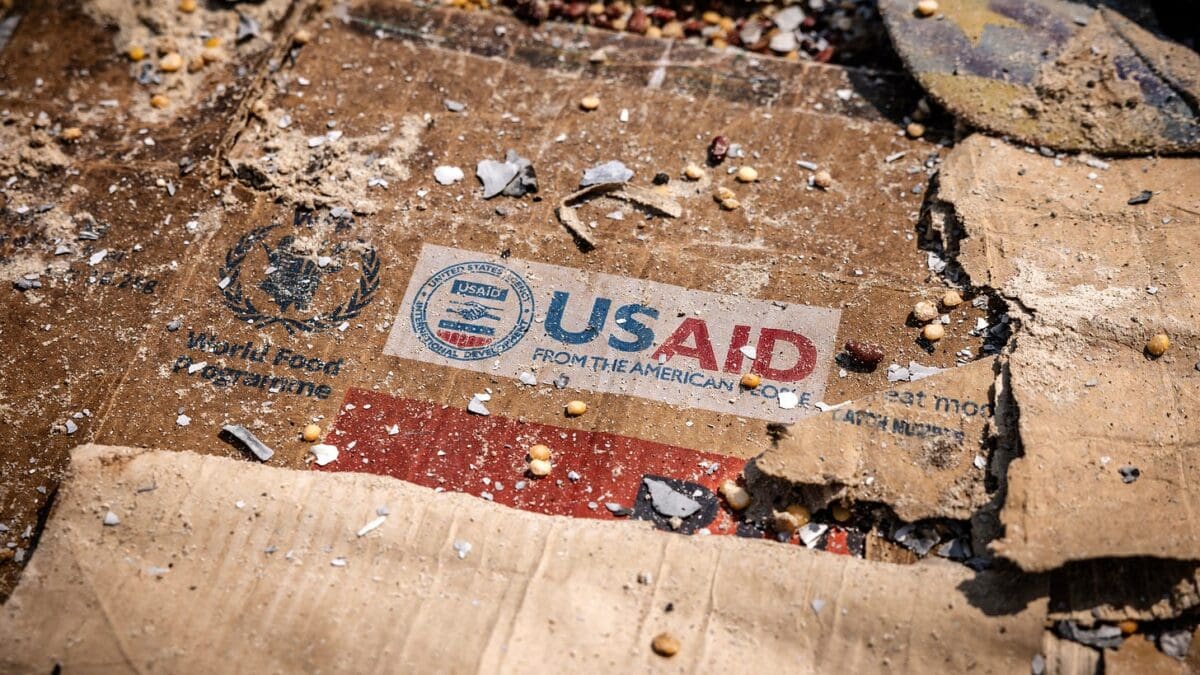
Stop Groping Greenland
April 3, 2025
A Lawyer Who Helped the Kushners Crack Down on Poor Tenants Now Helps Renters Fight Big Landlords
April 3, 2025“I THOUGHT THE GOVERNMENT followed the rules,” Carol told me. Carol worked at USAID. She was among those fired when the Trump administration gutted the agency, getting rid of all but a few hundred of the 10,000 employees. Now, even those few hundred are on the way out, as the administration announced on Friday that only fifteen employees will stay behind, the minimum number required by law.
The story of Carol’s final days at USAID—like the final days of so many others at the agency—is filled with sadness and sacrifice. It’s a story worth hearing not only because of what it says about the chaos, cruelty, and grievous harm of the closure of USAID, but also because it exposes two Trumpist lies about the agency: that its work was not important and that its employees were corrupt.
Since 1990, USAID has provided health, sanitation, food, and education to the Democratic Republic of Congo. Working in USAID’s Center for Education, Carol was responsible for supporting field staff, helping to make USAID’s education programs in the DRC as effective as possible.
By way of background, the DRC is resource rich—many rainforest- and mining-derived resources come from the DRC, including 50 percent of the world’s cobalt and 60 percent of the world’s coltan—yet it remains among the poorest countries in the world. As more than a hundred armed rebel groups are vying for control of the DRCs mineral wealth, there are millions of Congolese internally displaced by conflict. The country is beset by mismanagement of resources, autocratic rule, and a lack of investment. Basic public services—health care, education, sanitation, and clean water—are limited and unevenly available throughout the country. Nearly three quarters of the Congolese people live on less than $2.15 a day.
So you can imagine how USAID’s education assistance—ensuring that hundreds of thousands of students were taught, as well as providing educational materials used even more widely in the country—was an important source of stability and hope in these children’s lives.
Enter Donald Trump. Shortly after his inauguration on January 20, 2025, he issued Executive Order 14169 mandating a “90-day pause in United States foreign development assistance for assessment of programmatic efficiencies and consistency with United States foreign policy.”
Rumors immediately circulated at USAID about funding cuts, reorganization, and work stoppages. But agency leaders quelled the concern: After all, USAID’s education policy had been written in 2020 by one of Trump’s appointees, and the work of the Center for Education had been authorized by Congress.
In compliance with the executive order, USAID senior staff told employees not to schedule any overseas trips. But Carol had already planned a trip to the DRC the next day. In addition to meeting local researchers and partners from the University of Notre Dame, she was to strategize with the education team on how to meet the needs of the increasing numbers of children displaced by violence in the eastern part of the country.
Agency leaders in the United States and the DRC agreed that this work did not violate the executive order. Accordingly, Carol left Washington for Kinshasa, the capital of the DRC, on January 21, 2025. The following day, Carol met with project partners and colleagues in Kinshasa, preparing to launch the research phase of the work.
After the launch, Carol and her colleagues met for dinner to debrief and relax. But later that night, she received a stop-work order from the State Department which she initially thought was the beginning of the ninety-day formal review of the project.
That same night, Carol called into a team meeting at USAID headquarters. Although her boss had received little guidance from the State Department, she told her “Not to worry.” More ominously, Carol was told that the State Department did not want employees to speak directly to partners—that is, to representatives of the programs on the ground that USAID works with or funds. This put her in an untenable situation. At minimum, she needed to tell the team that work would stop, at least for now.
Predictably, they had many questions that Carol could not answer: If they were laid off, whether the work would begin, and what the process was for the ninety-day review. All she could say was “I don’t know.”
Meanwhile, in the eastern part of the country, clashes between the rebels and the Congolese Army were increasing, threatening everyone in the area with violence. Mission staff were particularly concerned that a work stoppage would accelerate the humanitarian crisis. Congolese continued to be displaced, and Ebola and Mpox were spreading rapidly. And many USAID staff were worried about their own families living in the eastern part of the country.
Despite the risks, the USAID mission sought permission to provide health and emergency assistance to relieve the humanitarian crisis unfolding in the east. This accorded with the State Department’s January 28 directive that exemptions to funding freezes would cover “life-saving medicine, medical services, food, shelter, and subsistence assistance.” But USAID’s financial systems were frozen, and many critical USAID staff were put on administrative leave. The waiver was a pretense.
By late January, the violence had spread to Kinshasa. From her hotel window, Carol saw fires and demonstrations in the streets. Angry protesters condemned the West for failing to provide military support to the DRC government to fight the rebels.
Senior USAID staff urged Carol to return to the States. But that was impossible: The city was in lockdown, hotels and businesses were being looted; protesters were trying to break through the walls of the U.S. embassy. Carol learned that rioters had breached a senior staff member’s home, forcing him to flee with his family to a safe house as his home was looted and destroyed.
Events became ever more perilous. Carol learned that Lucy Tamlyn, the U.S. ambassador, had called the DRC government for help without response. “The DRC government can’t protect us,” Carol told me at the time. When she called USAID headquarters, the responsible officers were out on administrative leave as part of the Trump administration’s effort to shut down the agency. Carol faced an increasingly dangerous situation as the civil unrest was directed at the West.
Finally, senior mission staff announced that all 250 employees—anyone working directly for or contracted for work with the U.S. government—and their families would be evacuated. But since Elon Musk’s DOGE crew had frozen all agency funds, Carol was unsure how this would happen. Finally, she was told that they would be evacuated at night by speedboats taking passengers out of the country—across the Congo River to Brazzaville, the capital of the neighboring Republic of Congo.
At 2:00 a.m. evacuees assembled and waited for their names to be called to get on one of the boats; if your name wasn’t called, you were instructed to assemble the next night. It was three anxious nights later that Carol was finally evacuated by speedboat to Brazzaville at 4:00 a.m.
At least for Carol, preparing for the evacuation was simple—she had been in the DRC for a short time. But, for the 250 USAID and embassy employees—many of whom had been living with their families in the DRC for years—the evacuation was traumatic. Because the speedboats were small, they were given a choice: they could each take one carry-on or a pet. Deciding on what to pack was even more wrenching, as they did not know if they would ever return.
The situation at the airport was hectic and disorganized—families with pets, children, luggage. The flight from Brazzaville to Washington, D.C. left at 2:00 a.m. Twenty hours later the passengers arrived in D.C. in the cold of winter. Few had winter clothes. Carol was more fortunate. She merely arrived home exhausted.
THE USAID EMPLOYEES coming home from the fighting in Kinshasa were not alone in facing tribulations as they returned to the United States from their postings abroad. Other agency workers went through their own harrowing crises. Meanwhile, in the days that followed, abuse of USAID employees continued. Having just risked their lives for the United States, they were called “criminal” and “worms” by Musk.
The government provided hotels for returning employees—many with families—for only two days. Because remote work was barred, thereafter employees had to find their own housing in the D.C. area. Those with children had to find schools and get their families settled.
Carol has colleagues still in D.C., not yet reimbursed for housing. In many cases they have incurred thousands of dollars of debt and don’t know if or when they will be reimbursed.
The evacuees had been told to report to the USAID headquarters in the Ronald Reagan Building on Monday morning, February 3. But that morning they were notified that the offices were closed. When Carol called the USAID help desk to find out if she was still employed, they could not tell her. (It was on that same day, February 3, that Musk tweeted he had spent the weekend “feeding USAID into the wood chipper.”)
By February 5, the USAID website contained a single notice: Everyone would be put on administrative leave, and all mission employees were called back to the United States. It wasn’t until February 23 that Carol was terminated. Within hours, she lost access to her email and other USAID services. On February 27 she received an alert that she had fifteen minutes to enter the Ronald Reagan Building to collect her belongings.
Carol feels a sense of deep betrayal, loss and anger. Our own government has treated her and the entire USAID workforce as if they were criminals. The Trump administration put those who served our government—U.S. citizens and host-nationals alike—in danger and left their futures in doubt. And again, Carol’s traumatic experience is just one of many across the globe: There are countless stories of USAID employees that have yet to be told.
Lawsuits challenging the Trump administration’s dismantling of USAID have been working their way through the courts. But even if the appeals process for some or all of them were to conclude that the administration acted unconstitutionally, that does not mean USAID is coming back. The workers are fired; the grants have been ended; the damage is done. A future president might someday relaunch USAID, but for Carol, for the generation of fired USAID employees now searching for jobs, for the agency’s partners around the globe, and for the recipients of our assistance, it’s too late. It’s an appalling, shameful decision, and one the United States is likely to come to regret.
Great Job Nancy Clair & the Team @ The Bulwark Source link for sharing this story.





